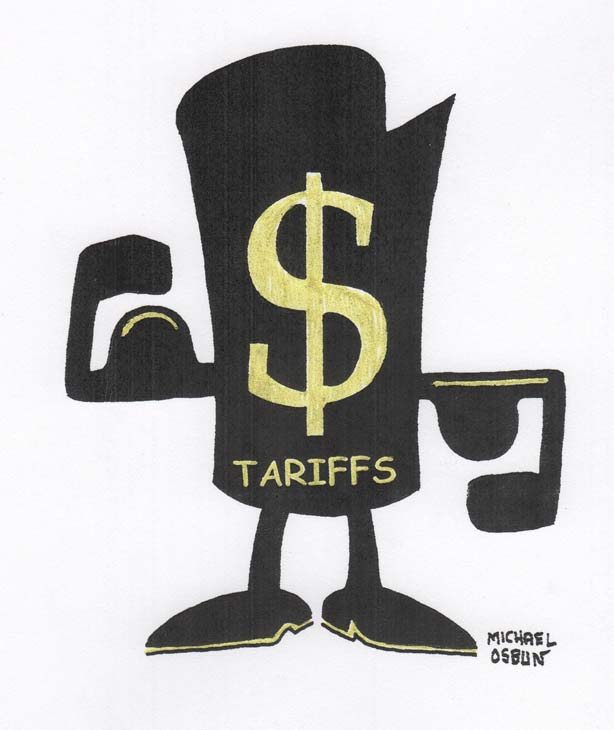
Don't buy stuff you don't need. But if you're thinking about buying a new iPhone, laptop or e-bike, consider pulling the trigger now or soon - before President Donald Trump's newly announced tariffs start to potentially raise the sticker prices.
There's a lot we don't know about how companies like Apple, Samsung and Nintendo will respond to tariffs on their products, nearly all of which are manufactured outside the United States and are now being hit with significantly higher tariffs.
On Friday, Nintendo said it would not let people pre-order its hotly anticipated Switch 2 video game console next week as it planned. The company cited the need to assess the potential impact of tariffs and evolving market conditions. It's among the first tangible signs of how tariffs are affecting popular products.
Odds are that you will feel at least some of the cost of tariffs in the electronics you buy within a few months, if not sooner. Here's a rundown of electronics products whose prices could increase the most in the coming months, assuming U.S. tariffs don't change from the White House announcement Wednesday.
• Apple's iPhone and other smartphones
Nearly all the iPhones that we buy in the United States are imported from China. Until the Trump administration took office in January, there were no tariffs on Chinese-made phones, laptops and tablets, thanks largely to Apple's negotiating tactics during the first Trump administration.
Not anymore. Its iPhones and other China-made products - most iPads and some Macs - will soon have a 54 percent tariff applied, unless Apple manages to negotiate a different arrangement.
According to estimates from economists and industry experts, that has the potential to increase the price of a $1,000 iPhone by $250 or more.
(A tariff, which is a tax on imported products, is not calculated on the $1,000 retail price for iPhones. Instead the tariff is based on the imported value of products, which is not typically made public. Economists have said the import value is roughly half of the iPhone's sticker price.)
We really don't know, though, how much of the tariff might show up in the iPhones you buy. To pay for new tariffs, Apple could take a smaller profit for itself, force its Chinese factories and parts suppliers to cut their prices to offset the tariffs, raise the prices of Apple products, or a mix of those three.
An Apple representative didn't respond to a request for comment.
Samsung makes far fewer of its smartphones in China. But it has significant manufacturing operations in Vietnam, which the White House said would have a new 46 percent tariff applied on imported products.
A Samsung representative declined to comment.
• Laptops
About 79 percent of laptops imported into the United States come from China, according to the Consumer Technology Association or CTA, a trade group whose members include Apple, Lenovo and Samsung. Those devices will have a tariff rate of 54 percent under the White House's proposal.
If electronics manufacturers raise their prices because of tariffs, it may not happen immediately. Ed Brzytwa, vice president of international trade for the CTA, said some electronics manufacturers rushed to import products into the United States last year, to have stockpiles in the country before Trump took office.
But those inventories will probably run out in a few months, he said, and tariffs will apply to newly made electronics coming into the United States. "Eventually companies will have to introduce new products to the marketplace," Brzytwa said.
In January, an analysis commissioned by the CTA estimated that U.S. laptop prices could increase by about $357 on top of the average retail price of $793. That calculation was based on a higher rate of Chinese tariffs than the one the White House announced this week.
• Video game consoles
They're also mostly made in China, and some in Vietnam.
The January analysis from the CTA estimated that U.S. prices for video game consoles from all countries could increase by about 40 percent as a result of tariffs. The estimate assumed that Americans would respond by buying far fewer consoles.
That would not be good news for companies like Nintendo and its Switch 2 game console, which is supposed to go on sale in June.
• E-bikes
Matt Moore, who oversees policy for the bicycle industry trade group People for Bikes, said prices for bicycles and e-bikes "will likely go up dramatically within one to two months."
Moore said many bicycles and e-bikes sold in the United States are made in China, Taiwan, Vietnam or Cambodia. Tariffs on Chinese-made e-bikes were already significant, but the newly announced tariffs take them to 79 percent, he said. Those e-bikes owed no import taxes before last year.
Moore also said companies may have no choice but to raise prices as a result of higher tariffs. The profit margins on bicycles are slim, which leaves less wiggle room for manufacturers or retail stores to absorb new costs.
"A large part of these very high additional duties will be passed along to consumers," Moore said.
(COMMENT, BELOW)


 Contact The Editor
Contact The Editor
 Articles By This Author
Articles By This Author